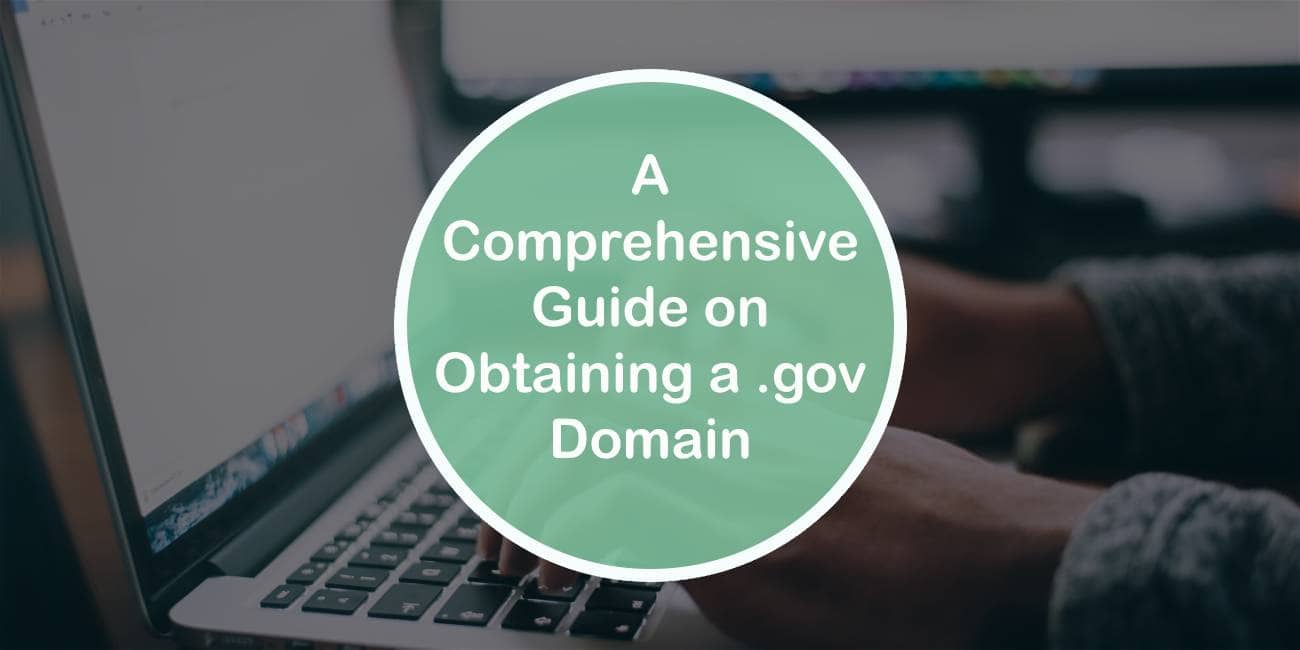Are you looking to establish your organization’s credibility and authority on the internet? Do you want to convey a sense of trustworthiness and official status to your online visitors? Look no further than obtaining a .gov domain! In today’s digital age, where misinformation and fake news abound, having a .gov domain can set your organization apart as an official government entity or agency. This comprehensive guide will take you through the ins and outs of obtaining a .gov domain, from understanding the eligibility criteria to navigating the application process. Whether you represent a federal, state, local government agency or an educational institution with governmental affiliations, this article will equip you with the knowledge and resources needed to secure this prestigious top-level domain.
Understanding the Importance of .gov Domains
Obtaining a .gov domain is crucial for establishing trust and credibility in the online space. As the exclusive top-level domain reserved for government entities, having a .gov extension immediately communicates authority and legitimacy to users. This can be particularly valuable for government agencies, as it helps to differentiate their official online presence from potentially misleading or fraudulent websites. By utilizing a .gov domain, government organizations can effectively convey their status as reliable sources of information, thereby instilling confidence in citizens seeking accurate and secure online resources.
Furthermore, the significance of .gov domains extends beyond mere symbolism; it also plays a pivotal role in enhancing cybersecurity efforts. With cyber threats becoming increasingly prevalent, having a secured top-level domain like .gov significantly reduces the risk of phishing attacks and other malicious activities that might target government institutions. This not only protects sensitive data and critical infrastructure but also safeguards citizens from potential cyber scams by ensuring that they are accessing authenticated government websites. In essence, obtaining a .gov domain not only reinforces trust but also serves as an essential measure to uphold security in the digital realm.

Eligibility Requirements
Eligibility requirements for obtaining a .gov domain are crucial and often stringent, reflecting the authoritative nature of government entities. Generally, only official government agencies at the federal, state, or local level are eligible to register a .gov domain. This requirement helps ensure that websites bearing this domain suffix can be trusted as authentic sources of government information. Furthermore, applicants must demonstrate their affiliation with a recognized government entity through formal documentation and verification processes.
The eligibility criteria for a .gov domain serve to uphold the integrity and credibility of government websites. Without these strict requirements, there would be an increased risk of fraudulent or misleading sites claiming governmental authority. Additionally, these regulations align with broader efforts to combat disinformation and increase digital security across public platforms. Adhering to such standards ultimately enhances public trust in online governmental resources while emphasizing the reliability and authenticity of information provided on official .gov websites.
Application Process
The application process for obtaining a .gov domain is a rigorous and detailed procedure that requires careful consideration and attention to detail. Government agencies seeking to acquire a .gov domain must first ensure that they meet the stringent eligibility criteria set forth by the General Services Administration (GSA). This includes providing documentation to prove their status as an official government entity, such as their federal agency code or letter of authorization from the appropriate government authority.
Once the eligibility requirements are met, the next step in the application process involves submitting a formal request to the GSA for review. This request should outline the purpose and intended use of the .gov domain, as well as provide evidence of compliance with all necessary regulations and policies. It’s important for applicants to thoroughly research and understand these requirements in order to submit a compelling and accurate application that demonstrates their commitment to upholding the credibility and integrity associated with a .gov domain.
Overall, navigating the application process for a .gov domain requires patience, thoroughness, and adherence to strict guidelines. It’s essential for government agencies to approach this process with utmost professionalism and respect for the significance of being entrusted with such a prestigious domain extension.

Security and Compliance Standards
Security and compliance standards play a crucial role in the process of obtaining a .gov domain. Government websites are entrusted with sensitive information and must adhere to stringent security measures to protect data integrity and confidentiality. Compliance with established standards such as FISMA (Federal Information Security Management Act) is essential for ensuring that government websites meet the necessary security protocols.
Moreover, adhering to compliance standards not only ensures the security of .gov domains but also fosters trust among citizens accessing these websites. Demonstrating compliance with regulations instills confidence in users, assuring them that their interactions with government websites are secure and safeguarded against potential cyber threats. Therefore, embracing security and compliance standards not only signifies a commitment to protecting sensitive information but also contributes to building public trust in government digital platforms.
Maintenance and Renewal
Maintenance and renewal are crucial aspects of managing a .gov domain. Regular maintenance ensures that the website remains secure, up to date, and optimized for performance. This includes monitoring for security vulnerabilities, updating software and plugins, and conducting regular backups to protect against data loss. Renewal of the domain registration is equally important to prevent expiration and potential loss of ownership. Having a well-defined maintenance schedule and setting up auto-renewal for the domain registration can help streamline these processes and ensure continuous operation without interruptions.
Moreover, keeping abreast of industry best practices and emerging trends is essential for effective maintenance and renewal strategies. By regularly reviewing the website’s performance metrics, user feedback, and technological advancements in web development, government agencies can proactively adapt their digital presence to meet evolving needs. Additionally, incorporating sustainable practices such as optimizing energy consumption through server efficiency or utilizing renewable energy sources for hosting can align with broader governmental initiatives focused on environmental responsibility.
Ultimately, prioritizing maintenance and renewal not only safeguards the integrity of the .gov domain but also demonstrates a commitment to providing reliable online services to citizens while staying ahead in a rapidly changing digital landscape.

Benefits of a .gov Domain
A .gov domain offers numerous benefits for government entities and organizations. Firstly, it signals trust and credibility to the public, as it is exclusively reserved for U.S. federal, state, local, and tribal government agencies. This instantly establishes an authoritative online presence that conveys legitimacy and reliability to citizens seeking official information or services. Additionally, having a .gov domain enhances cybersecurity measures by providing more robust protection against phishing attacks and unauthorized access. This heightened security not only safeguards sensitive government data but also assures the public of a secure digital environment when engaging with governmental websites.
Furthermore, a .gov domain can significantly improve search engine visibility and ranking for government websites. Search engines often prioritize authoritative domains like .gov in their algorithms due to their trusted status. This boosts the discoverability of official government content, ensuring that crucial information reaches a wider audience efficiently. In essence, the distinct advantages of a .gov domain not only enhance public trust but also strengthen the overall digital infrastructure of government institutions.
Conclusion
In conclusion, obtaining a .gov domain is not just about acquiring a web address; it signifies credibility, authority, and trustworthiness. It’s a symbol of legitimacy in the digital realm, carrying significant weight due to its association with governmental entities at local, state, and federal levels. By following the rigorous application process and meeting the stringent eligibility criteria, organizations can cement their status as reliable sources of official information and services. Furthermore, a .gov domain offers heightened protection against fraudulent activities that often target government websites, ensuring visitors can engage with content that has been vetted for authenticity.
As we wrap up this comprehensive guide on obtaining a .gov domain, it’s important to recognize the responsibility that comes with such an esteemed online presence. Maintaining transparency, adhering to security protocols, and providing accurate information becomes paramount when operating within the confines of a .gov domain. Organizations holding this distinction must continually uphold standards of excellence to fortify public trust and contribute positively to the digital landscape through their authoritative online presence.

